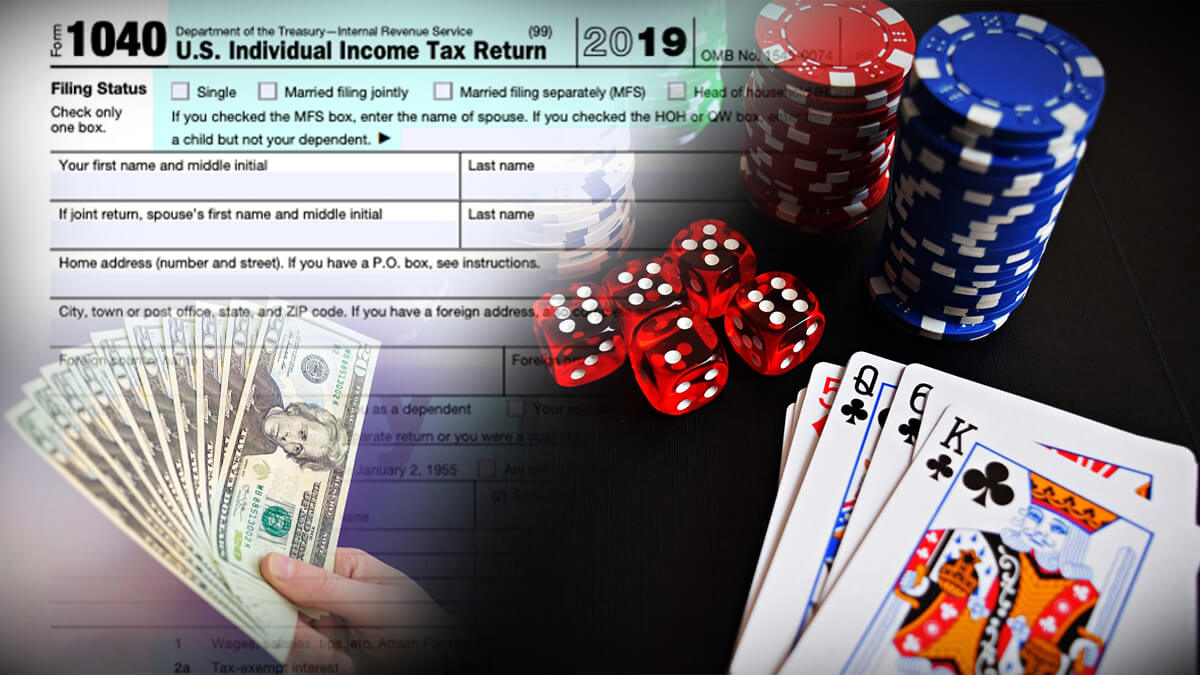
- Casino Winnings Taxable In Canada
- Casino Winnings Taxable
- Casino Winning Taxable Money
- Casino Winnings Tax Free
How Casino Winnings Are Taxed As stated earlier, the federal government levy tax on both cash and non-cash winnings. Returns gotten from wagers placed on bingo, keno, lottery, raffles, sweepstakes and slots including non-cash winnings like trips and vehicles are taxable. It is the Fair Market Value (FMV) of non-cash winnings that are taxed. About Publication 515, Withholding of Tax on Nonresident Aliens and Foreign Entities. Publication 3079 PDF, Tax-Exempt Organizations And Gaming (PDF) Online Ordering for Information Returns and Employer Returns. Treasury Decision 9807, Information Returns; Winnings from Bingo, Keno, and Slot Machines. Your state will tax the winnings too, unless you live in a state that does not impose a state-level income tax. The tax rate will be determined by your income. So, for instance, if you make $42,000 annually and file as single, your federal tax rate is 22%. If you win $1,000, your total income is $43,000, and your tax rate is still 22%.
Gambling In America
If you've ever won a jackpot in Las Vegas, you probably know that your excitement diminishes at least a little when the casino throws a W-2G tax form in your face. In fact, if you don't provide your social security number, the casino will automatically withhold up to 30% of your winnings. The same goes for lottery and horse racing wins above $1200. Yet when playing online, paying taxes isn't always so black and white.
Americans who play at US-based online casinos will usually have to deal with withholding taxes just like in Las Vegas. Yet that only represents a small fraction of your entertainment options. When playing at licensed offshore online casinos or poker rooms, American players usually won't hear the words taxes mentioned at all.
Sadly, it is never safe to assume that your winnings are ultimately tax-free. It is true that Americans who play at internet gambling sites outside of the USA won't be subject to withholding taxes when withdrawing their winnings. Yet you may be required to report these gains when you file your taxes in April. The greatest determinant is the number, size, and frequency of your wins. The actual threshold varies from state to state and whether or not you are an amateur or professional. For more information on reportable gambling winnings visit the IRS guide: https://www.irs.gov/instructions/iw2g/ar02.html
Professional Gamblers
Whether or not you qualify as a professional gambler doesn't solely depend on your performance at the tables. The main litmus test is the expectation and probability of profit in the eyes of the Internal Revenue Service. Your success and whether or not you have a regular job on top of gambling may also be factors.
With even amateur gamblers having to deal with taxes, professional gambling does have benefits. You can actually deduct your wins from your losses when your treat your gameplay as a business. No matter what your current status is and how often you play, it's best to keep tabs on your performance to develop strategies, stick to a budget, and simply know where you stand. You can find this tip sheet courtesy of the IRS: https://www.irs.gov/taxtopics/tc419.html

Whether or not the IRS can actually track your winnings is another matter entirely. Yet you should be aware of your obligations. With a huge budget deficit and ballooning debt, the federal government is looking to fill their financial holes any way they can. Between the NSA and modern forensic accounting practices, covering your digital tracks is more difficult than it used to be.
Tax Obligations Outside Of The USA
The United States is a bit of an outlier when it comes to taxing gambling winnings. In the United Kingdom, the government taxes the gross profits of casino operators rather than players. Canadians can play the lottery, live casinos, poker and online games without paying taxes unless they are a professional. Likewise, Australians and New Zealanders can also gamble tax-free. To put things in perspective, Americans do pay some of the lowest personal income taxes in the first world. Things tend to even out in the end.
Like anything else, interpreting the rules is always a matter of debate. Here's an interesting tax perspective for Canadians: http://business.financialpost.com/personal-finance/tax-expert-a-gamble-over-poker-winnings
Things To Consider
Keep in mind that Americans have to deal with both Federal and State taxes on most forms of income. Always keep basic records no matter how often you play or win. This will make things easier during tax season.
Accountants Have The Answers
No matter where you live, it's always best to discuss your personal situation with a licensed tax professional in your area. You can usually get a short consultation for free with complete confidentiality. It's the best way to play by the rules while minimizing your tax burden.
The glittering lights and ringing bells of the casino. The dream of winning the lottery. Gambling can be a lot of fun for most people, and when your number finally comes up -- well, isn't that the whole point?
Of course, we all want to go home big winners with a wad of cash in our pockets. However, once you win, the IRS does, too. In fact, they expect and require you to report your gambling winnings. Gambling winnings (which the IRS refers to as 'income') can include:
Advertisement

Advertisement

- Lotteries
- Raffles
- Horse/dog races
- Noncash prizes -- like cars, trips or houses

- Casino Winnings Taxable In Canada
- Casino Winnings Taxable
- Casino Winning Taxable Money
- Casino Winnings Tax Free
How Casino Winnings Are Taxed As stated earlier, the federal government levy tax on both cash and non-cash winnings. Returns gotten from wagers placed on bingo, keno, lottery, raffles, sweepstakes and slots including non-cash winnings like trips and vehicles are taxable. It is the Fair Market Value (FMV) of non-cash winnings that are taxed. About Publication 515, Withholding of Tax on Nonresident Aliens and Foreign Entities. Publication 3079 PDF, Tax-Exempt Organizations And Gaming (PDF) Online Ordering for Information Returns and Employer Returns. Treasury Decision 9807, Information Returns; Winnings from Bingo, Keno, and Slot Machines. Your state will tax the winnings too, unless you live in a state that does not impose a state-level income tax. The tax rate will be determined by your income. So, for instance, if you make $42,000 annually and file as single, your federal tax rate is 22%. If you win $1,000, your total income is $43,000, and your tax rate is still 22%.
Gambling In America
If you've ever won a jackpot in Las Vegas, you probably know that your excitement diminishes at least a little when the casino throws a W-2G tax form in your face. In fact, if you don't provide your social security number, the casino will automatically withhold up to 30% of your winnings. The same goes for lottery and horse racing wins above $1200. Yet when playing online, paying taxes isn't always so black and white.
Americans who play at US-based online casinos will usually have to deal with withholding taxes just like in Las Vegas. Yet that only represents a small fraction of your entertainment options. When playing at licensed offshore online casinos or poker rooms, American players usually won't hear the words taxes mentioned at all.
Sadly, it is never safe to assume that your winnings are ultimately tax-free. It is true that Americans who play at internet gambling sites outside of the USA won't be subject to withholding taxes when withdrawing their winnings. Yet you may be required to report these gains when you file your taxes in April. The greatest determinant is the number, size, and frequency of your wins. The actual threshold varies from state to state and whether or not you are an amateur or professional. For more information on reportable gambling winnings visit the IRS guide: https://www.irs.gov/instructions/iw2g/ar02.html
Professional Gamblers
Whether or not you qualify as a professional gambler doesn't solely depend on your performance at the tables. The main litmus test is the expectation and probability of profit in the eyes of the Internal Revenue Service. Your success and whether or not you have a regular job on top of gambling may also be factors.
With even amateur gamblers having to deal with taxes, professional gambling does have benefits. You can actually deduct your wins from your losses when your treat your gameplay as a business. No matter what your current status is and how often you play, it's best to keep tabs on your performance to develop strategies, stick to a budget, and simply know where you stand. You can find this tip sheet courtesy of the IRS: https://www.irs.gov/taxtopics/tc419.html
Whether or not the IRS can actually track your winnings is another matter entirely. Yet you should be aware of your obligations. With a huge budget deficit and ballooning debt, the federal government is looking to fill their financial holes any way they can. Between the NSA and modern forensic accounting practices, covering your digital tracks is more difficult than it used to be.
Tax Obligations Outside Of The USA
The United States is a bit of an outlier when it comes to taxing gambling winnings. In the United Kingdom, the government taxes the gross profits of casino operators rather than players. Canadians can play the lottery, live casinos, poker and online games without paying taxes unless they are a professional. Likewise, Australians and New Zealanders can also gamble tax-free. To put things in perspective, Americans do pay some of the lowest personal income taxes in the first world. Things tend to even out in the end.
Like anything else, interpreting the rules is always a matter of debate. Here's an interesting tax perspective for Canadians: http://business.financialpost.com/personal-finance/tax-expert-a-gamble-over-poker-winnings
Things To Consider
Keep in mind that Americans have to deal with both Federal and State taxes on most forms of income. Always keep basic records no matter how often you play or win. This will make things easier during tax season.
Accountants Have The Answers
No matter where you live, it's always best to discuss your personal situation with a licensed tax professional in your area. You can usually get a short consultation for free with complete confidentiality. It's the best way to play by the rules while minimizing your tax burden.
The glittering lights and ringing bells of the casino. The dream of winning the lottery. Gambling can be a lot of fun for most people, and when your number finally comes up -- well, isn't that the whole point?
Of course, we all want to go home big winners with a wad of cash in our pockets. However, once you win, the IRS does, too. In fact, they expect and require you to report your gambling winnings. Gambling winnings (which the IRS refers to as 'income') can include:
Advertisement
Advertisement
- Lotteries
- Raffles
- Horse/dog races
- Noncash prizes -- like cars, trips or houses
What you need to report depends on how much you win, what type of gambling you were doing, and the ratio of your winnings to your wager.
Typically, you'll receive paperwork from the casino (or other source of your payout) to complete if you win a certain amount. You must provide your Social Security number and fill out IRS Form W-2G. This form is called 'Certain Gambling Winnings,' and allows you to report your winnings as income to Uncle Sam. You'll receive that paperwork if you win:
- $600 or more from the state lottery, horse or dog races, jai alai or other wagering (but only if the winnings are 300 times the original wager)
- $1,200 or more at a slot machine or bingo
- $1,500 or more on keno (minus the amount you spent on tickets for the winning game)
- $5,000 or more in poker tournaments
Typically in a winner situation of $5,000 or more (no matter what the game), the payee will not only require you to fill out the above-mentioned forms, but will also take 25 percent of your winnings up front to give directly to Uncle Sam [source: Bell]. If you refuse to fill out the form or provide your Social Security number, most establishments will take 28 percent of your winnings, in accordance with federal law [source: IRS].
You don't have to fill out the W2-G form for winnings on table games, including craps, blackjack, pai gow, baccarat and roulette. However, you still have to report those winnings when you file your regular income tax in April. On form 1040, on the 'Other Income' line (line 21) you report any other winnings, like prize or award money.
Casino Winnings Taxable In Canada
Here's where things can get a little more complicated. Just as you report your winnings to the IRS, you can also report your losses. On line 28 of form 1040, 'Other Miscellaneous Deductions,' if you have any gambling losses, note them there. However, your losses can't exceed your winnings. It's also important to note that you'll only want to do this if you're already itemizing your deductions and will end up deducting more than the standard [source: IRS]
All of this information illustrates why it's crucial to keep detailed records of your gambling -- both wins and losses -- especially if you do it often . Signing up for a player's card at a casino is a great idea, because the casino keeps an electronic record for you to easily access [source: Taxpertise].
The takeaway here is that the IRS treats any gambling or contest winnings as income. You should report all of it, even if the casino or other payee doesn't hand you a tax form to fill out. State tax laws apply too so be sure to check with your state's department of revenue to determine your liability [source: Ritchie].
Advertisement
Casino Winnings Taxable
Related Articles
Casino Winning Taxable Money
Sources
Casino Winnings Tax Free
- Bell, Kay. 'Reporting gambling winnings.' Bankrate. Feb. 3, 2014. (Sept. 22, 2014) http://www.bankrate.com/finance/money-guides/reporting-gambling-winnings.aspx
- IRS. 'Gambling Winnings Are Always Taxable Income.' Aug. 19, 2014. (Sept. 22, 2014) http://www.irs.gov/uac/Gambling-Winnings-Are-Always-Taxable-Income
- IRS. 'Instructions for Forms W-2G and 5754.' 2014. (Sept. 22, 2014) http://www.irs.gov/pub/irs-pdf/iw2g.pdf
- Ritchie, Josh. 'How Are Gambling Winnings Taxed?' TurboTax Blog. March 30, 2012. (Sept. 22, 2014) http://blog.turbotax.intuit.com/2012/03/30/how-are-gambling-winnings-taxed/
- Roche, Yolanda S., E.A. and Roche, Roger C., E.A. 'The Taxman Cometh.' Las Vegas Review-Journal. 2014. (Sept. 22, 2014) http://www.reviewjournal.com/business/casinos-gaming/features/taxlaws.html
- Taxpertise. 'Uncle Sam Wants His Cut on Your Gambling Winnings.' FOXBusiness. Sept. 20, 2013. (Oct. 30, 2014) http://www.foxbusiness.com/personal-finance/2013/09/19/uncle-sam-wants-his-cut-on-your-gambling-winnings/

